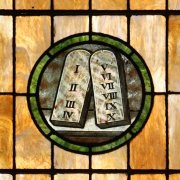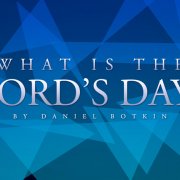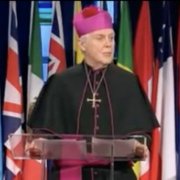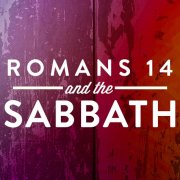(Download PDF)
I remember kicking against the 7th day (Saturday) Sabbath.[i] I remember spending hours combing through the scriptures, looking for passages that would justify its not being binding on me today. Sure it was established at creation. Sure, it was one of the 10 commandments. Sure, God said it would be a “perpetual” commandment, to be observed “forever” (Ex. 31:16-17). But I remember finding an ambiguous passage here, or a theological rationalization there that would satisfy me for the moment — but that would soon leave me thirsty, and unsatisfied, looking for more answers. In the back of my mind, I couldn’t help but wonder if I was just rationalizing away my own disobedience — rather than objectively weighing the full weight of biblical testimony and witness.
If this has been your experience too, I invite you to stop what you’re doing for a moment, put down your theological weapons, loosen your grip on your counter-arguments, and open up your heart to the possibility that the 4th commandment might be for today — that God may be holding out previously unknown rest, and blessings, and joy to you — and all you have to do is reach out and take hold.
Reason #1: God finished His work of creation on the 7th day (Gen. 2:2-3, Ex. 31:17)
Reason #2: God uniquely blessed the 7th day (Gen. 2:3)
Reason #3: God made the 7th day “holy” — that is, “set apart” from all other days (Gen. 2:3, Ex. 31:14)
Reason #4: God rested from all His labors on the 7th day Sabbath (Gen. 2:2-3)
Reason #5: Man is made in God’s image, and since God rested on the 7th day, part of bearing God’s image means keeping the 7th day Sabbath (Gen. 1:26-27).
Reason #6: The Saturday Sabbath is one of the 10 commandments (Ex. 20:8-11, Deut. 5:12-15).
Reason #7: God says “above all” believers are to keep his Sabbaths (Ex 31:13)
Reason #8: God tells his people to keep the Saturday Sabbath so that they know that God is the one who sanctifies them — that is, sets them apart from all other people (Ex 31:13)
Reason #9: God tells his people to keep the Sabbath “throughout your generations.” (Ex. 31:13, 16-17)
Reason #10: The Saturday Sabbath is a sign or a mark of God’s authority over his people (Ex. 31:13, 17)
Reason #11: God tells his people to keep the Sabbath “forever.” (Ex. 31:16)
Reason #12: The 7th day, Saturday Sabbath is an eternal covenant (Ex. 31:16-17)
Reason #13: The Saturday Sabbath commandment was written with the finger of God (Ex. 31:18, Deut. 9:10).
Reason #14: God does not change his mind (Numbers 23:19)
Reason #15: God commands His people to teach His Law/Instructions (Heb: Torah) diligently to their children, and His Law includes the commandment to keep the 7th day Sabbath. (Deut. 4:9, 6:7, 11:19, 32:46)
Reason #16: God says that his commandments (including the Sabbath) are not too hard for us to do (Deut. 30:11)
Reason #17: God sent Israel into captivity for breaking the Sabbath (Nehemiah 13:17)
Reason #18: Those who observe the Saturday Sabbath will be given “a monument and a name better than sons and daughters” (Isa. 56:5)
Reason #19: God promises to specially bless those who keep the Saturday Sabbath (Isa. 56:2)
Reason #20: God promises to not cut off those who keep the Saturday Sabbath (Isa. 56:3-6)
Reason #21: God promises that he will bring those who keep the Saturday Sabbath to his Holy Mountain (Isa. 56:7)
Reason #22: God promises to make joyful those who keep the Saturday Sabbath (Isa. 56:7)
Reason #23: The Sabbath is intended to be a delight (Isaiah 58:13)
Reason #24: God promises that we will “find our joy in the LORD” when we keep the Saturday Sabbath (Isa. 58:13)
Reason #25: God promises that those who keep the Saturday Sabbath will “ride on the heights of the land” (Isa. 58:13)
Reason #26: God promises that those who keep the Saturday Sabbath will “feast on the inheritance of our father Jacob” (Isa. 58:13-14)
Reason #27: In the future, after the Final Judgment, the Sabbath will still be in effect (Isa. 66:22-23)
Reason #28: God uses the Sabbath as a time marker when referring to the New Heavens and New Earth, showing that the Sabbath will still be in effect in the world to come (Isaiah 66:23)
Reason #29: Forgetting the Saturday Sabbath is a punishment (Lamentations 2:6)
Reason #30: The Lord gave the Sabbath as a sign or a mark between Him and His people (Ezekiel 20:12-24)
Reason #31: God mentioned Sabbath breaking in a list of indictments against his people, along with other “moral” issues (Ezekiel 22:8, 26, 23:38)
Reason #32: The prophet Ezekiel describes a future temple in which the Sabbath will still be in effect (Ezekiel 46:1-12)
Reason #33: The Bible warns that the devil will seek to change times, laws, Sabbaths, etc. (Daniel 7:25)
Reason #34: God takes away the Sabbaths and the Feasts as a punishment (Hosea 2:11)
Reason #35: God wouldn’t change the day of the Sabbath, or nullify it, without speaking this through the mouth of the prophets first (Amos 3:7)
Reason #36: God does not change (Malachi 3:6)
Reason #37: Jesus did not come to abolish even the least of God’s commandments (Matt. 5:17-19)
Reason #38: Nothing will pass from the Torah until ALL is accomplished (Matt. 5:18)
Reason #39: Those who break the Saturday Sabbath will be called “least” in the kingdom of heaven (Matt. 5:19)
Reason #40: Those who teach others to break the Sabbath will be called “least” in the kingdom of heaven (Matt. 5:19)
Reason #41: Those who keep the Saturday Sabbath (along with God’s other commandments) will be called “great” in the kingdom of heaven. (Matt. 5:19)
Reason #42: Those who teach others to keep the Saturday sabbath will be called “great” in the kingdom of heaven. (Matt. 5:19)
Reason #43: Jesus will say he does not know those who practice lawlessness (Matt. 7:23)
Reason #44: Jesus taught his disciples how to properly keep the 7th day Sabbath, with the expectation that his followers would keep it as he did (Matt. 12:10-12, Mark 2:27-28, 3:2-4, Luke 6:1-11)
Reason #45: Jesus told his disciples to pray that they wouldn’t have to flee on the Sabbath (Matt. 24:20)
Reason #46: Jesus taught that the Sabbath would be in effect after his death and before the great tribulation (Matt. 24:20-21)
Reason #47: Jesus set our example by observing the Saturday Sabbath (Mark 1:21, 6:2, Luke 4:16, 13:10, ).
Reason #48: Even after his crucifixion, some women “rested on the Sabbath in obedience to the commandment.” (Luke 23:56)
Reason #49: Jesus told his followers that the Saturday Sabbath was made for mankind (Mark 2:27-28).
Reason #50: Jesus said “If you love me, you will obey what I command” (John 14:15), and Jesus told his followers to keep the 7th day Sabbath (Mark 2:27-28, Matt. 5:17-19)
Reason #51: The disciples (including Paul) continued to observe the Sabbath after Jesus’s death (Acts 13:14, 16:13)
Reason #52: The Jerusalem council gave gentiles four basic commandments because they knew they would learn the rest of God’s commandments in the Synagogues on the 7th day Sabbath (Acts 15:21)
Reason #53: It was Paul’s habit to keep the 7th day Sabbath (Acts 17:2)
Reason #54: Paul kept the Saturday Sabbath every week (Acts 18:4)
Reason #55: Paul taught his churches to uphold the Law/Torah of God (Romans 3:31)
Reason #56: Jesus kept the Saturday Sabbath, and Paul was an imitator of Jesus, teaching others to imitate both himself and Jesus (1 Cor. 11:1)
Reason #57: Paul taught others to imitate himself (1 Cor. 11:1), and Paul kept the 7th day Sabbath (Acts 13:14; 16:13; 17:2)
Reason #58: All scripture is profitable for reproof, correction, and training in righteousness — and “all scripture” would include the 7th day Sabbath (2 Tim. 3:16)
Reason #59: The Author of Hebrews says, “There remains, then, a Sabbath-keeping for the people of God” (Heb.4:9, Grk).
Reason #60: We are to “walk as [Jesus] walked,” and Jesus kept the Saturday Sabbath (1 John 2:6)
Reason #61: We are told that love for God = obeying his commandments (1 John 5:3).
Reason #62: God’s commandments are not supposed to be burdensome (1 John5:3).
Reason #63: The Book of Revelation praises those living in the end-times who keep God’s commandments — which would include the 7th day Sabbath (Rev. 12:17)
Endnote:
[i] According to the Biblical reckoning of time, days of the week are counted from evening to evening (cf. Genesis 1:5, Exodus 12:18, Leviticus 23:32, etc.), so in the Bible, the 7th day technically begins at sundown on Friday and ends at sundown on Saturday. The reader should be aware that, for the sake of clarity and brevity, I’ve chosen to use the terms “7th day Sabbath” and “Saturday Sabbath” synonymously. In other words, I’m using both phrases to express same Biblical calculation of time (Friday evening to Saturday evening).
By Robert Roy
© MessianicPublications.com








Recent Comments: